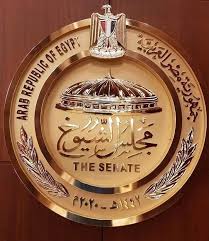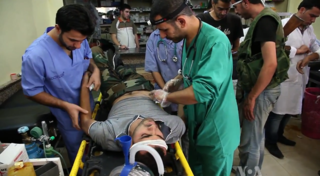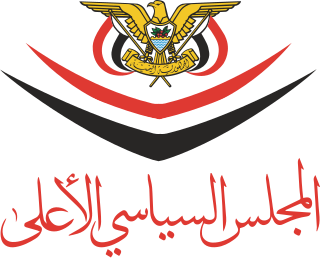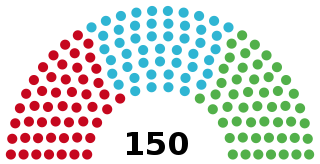Related Research Articles

The politics of Egypt takes place within the framework of a republican semi-presidential system of government. The current political system was established following the 2013 Egyptian military coup d'état, and the takeover of President Abdel Fattah el-Sisi. In the current system, the President is elected for a six-year term. He can appoint up to 5 percent of the parliament. Furthermore, the President has the power to dissolve Parliament through Article 137. The Parliament of Egypt is the oldest legislative chamber in Africa and the Middle East. The unicameral Parliament has the ability to impeach the President through Article 161. With 2020 elections to the new Senate, the chamber became bicameral.

The Senate is the upper house of the bicameral Parliament of Egypt since its introduction in the 2019 Egyptian constitutional referendum and the subsequent 2020 Egyptian Senate election. The current president of the Senate is Abdel-Wahab Abdel-Razeq.

The Consultative Assembly is the legislative body of the State of Qatar, with 45 members. Following the 2021 Qatari general election, it has 30 elected members and 15 appointed members. The body can only question the prime minister, who is appointed by the Emir of Qatar, on his policies if two-thirds of the members agree, which is unlikely given that one-third of the members are appointed by the Emir.


The Leadership Council of the Islamic Emirate of Afghanistan, also translated as the Supreme Council, is an advisory council to the supreme leader of Afghanistan. The supreme leader convenes and chairs the council at his sole discretion. He has ultimate authority and may override or circumvent it at any time. It played a key role in directing the Taliban insurgency from Quetta, Pakistan, which led to it being informally referred to as the Quetta Shura at the time.
General elections were held in Qatar for the first time on 2 October 2021, following an announcement by the Emir of Qatar on 22 August 2021. The elections for the Consultative Assembly were originally scheduled to be held in the second half of 2013, but were postponed in June 2013 until at least 2016. In 2016 they were postponed again. Finally, in November 2020, Emir Tamim bin Hamad Al Thani pledged to hold the election in October 2021.
Riad Mousa al-Asaad is a Syrian military commander, politician who is the founding leader of the Free Syrian Army. One of the prominent faces of the Syrian Revolution, he led the armed resistance to the Assad regime as commander-in-chief of FSA, during the early phase of the Syrian Civil War. Under Riad al-Asaad's command, FSA expanded into a para-military force of 75,000 guerillas and insurgents in March 2012; capable of ousting regime forces from Damascus. He currently serves as the Deputy Prime Minister for Military Affairs of the Syrian Salvation Government, a position he has held since 2 November 2017. He was a former Colonel in the Syrian Air Force who defected to the opposition in July 2011 and became the first Acting Commander-in-chief of the Free Syrian Army.

The Syrian opposition is the political structure represented by the Syrian National Coalition and associated Syrian anti-Assad groups with certain territorial control as an alternative Syrian government.
Abu Khalil al-Madani was a member of al-Qaeda's Shura Council. Believed to be a Saudi, little was known about his views, however in a 2013 audio message released online, he repeated familiar Al Qaeda themes of the Muslim world being weakened by a lack of Islamic faith and American conspiracies. In April 2014, al-Madani released an audio statement attempting to mediate the conflict between Syrian-based Jihadist groups, Al-Nusra Front and the Islamic State of Iraq and the Levant.

Estimates of the total number of deaths in the Syrian Civil War, by opposition activist groups, vary between 603,064 and about 620,000 as of August 2023. In late September 2021, the United Nations stated it had documented the deaths of at least 350,209 "identified individuals" in the conflict between March 2011 and March 2021, but cautioned the figure was "certainly an under-count" that specified only a "minimum verifiable number".

The Syrian Interim Government (SIG) is an alternative government in Syria, formed by the umbrella opposition group, the National Coalition for Syrian Revolutionary and Opposition Forces. The interim government indirectly controls some areas of the country and claims to be the sole legitimate government on behalf of the Syrian opposition in defiance of the Council of Ministers of the Syrian Arab Republic. The interim government's headquarters in Syria are located in the city of Azaz in Aleppo Governorate.

The Supreme Political Council is a largely unrecognised executive body formed by the Houthi movement and the General People's Congress (GPC) to rule Yemen. Formed on 28 July 2016, the presidential council consists of nine members and was headed by Saleh Ali al-Sammad as president until his death from a drone air strike on 19 April 2018 with Qassem Labozah as vice-president. The territory that it rules consists most of the former North Yemen, which united with South Yemen in 1990.

The Turkish Armed Forces and its ally the Syrian National Army have occupied areas of northern Syria since August 2016, during the Syrian Civil War. Though these areas nominally acknowledge a government affiliated with the Syrian opposition, in practice they constitute a separate proto-state under the dual authority of decentralized native local councils and Turkish military administration.

The Syrian Salvation Government is a de facto alternative government of the Syrian opposition in Idlib Governorate, formed in early November 2017 under the initiative of Hay'at Tahrir al-Sham (HTS) rebel coalition. There followed weeks of conflict between the Syrian Salvation Government (SSG) and the Syrian Interim Government (SIG), with reports of Hayat Tahrir al-Sham unilaterally disbanding several SIG-supported local councils across northwestern Syria.

The First Syrian Republic, officially the Syrian Republic, was formed in 1930 as a component of the Mandate for Syria and the Lebanon, succeeding the State of Syria. A treaty of independence was made in 1936 to grant independence to Syria and end official French rule, but the French parliament refused to accept the treaty. From 1940 to 1941, the Syrian Republic was under the control of Vichy France, and after the Allied invasion in 1941 gradually went on the path towards independence. The proclamation of independence took place in 1944, but only in October 1945 was the Syrian Republic de jure recognized by the United Nations; it became a de facto sovereign state on 17 April 1946, with the withdrawal of French troops. It was succeeded by the Second Syrian Republic upon the adoption of a new constitution on 5 September 1950.

The Syrian Constitutional Committee is a United Nations-facilitated constituent assembly process that seeks to reconcile the Syrian Government headed by President Bashar al-Assad and the Syrian opposition, in the context of the Syrian peace process, by amending the current or adopting a new Constitution of Syria. The UN hopes that this would lead to negotiations which would subsequently lead to a peaceful end of the Syrian Civil War, which had been raging for more than eight years by the time of the committee's formation. The Constitutional Committee was formed with the formal approval of both parties involved—namely the Government of the Syrian Arab Republic and the opposition Syrian Negotiations Commission, with the facilitation of the United Nations.
2020s political history refers to significant political and societal historical events of the 2020s, presented as a historical overview in narrative format.
Ali Abdulrahman Keda is a Syrian politician and engineer serving as the third Prime Minister of the Syrian Salvation Government since 2019.
References
- ↑ "Once longing for an 'emirate' in Syria, HTS now struggles for survival". Syria Direct. 2020-04-30. Retrieved 2023-06-01.
- ↑ Hugo (2020-04-24). "Salvation Government Elects New Shura Council President". The Syrian Observer. Retrieved 2023-06-01.